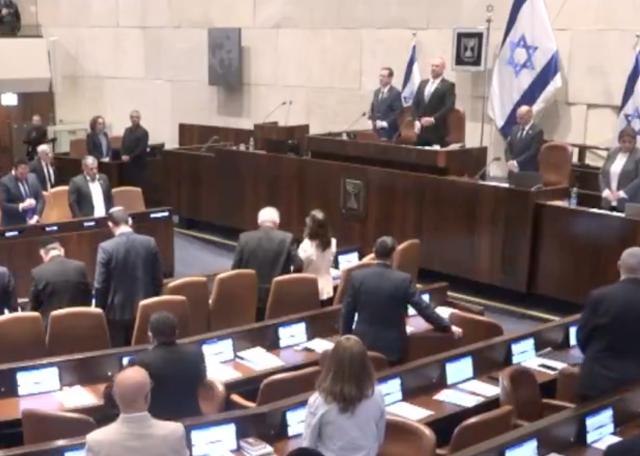In a stirring address during the Knesset's 75th anniversary, Opposition Leader Yair Lapid delivered a poignant critique of Israel’s political dynamics, underscoring the challenges faced by the nation in the wake of recent upheavals. Lapid’s speech, set against the backdrop of a solemn ceremony marred by recent tragic events, highlighted the existential crisis confronting Israel’s political system.
Lapid questioned the very essence of the celebration, positing a dissonance between the Knesset's anniversary and the somber mood of the nation. He depicted a country besieged by grief and uncertainty, with citizens grappling with the aftermath of violence and loss. His words painted a vivid picture of a nation at a crossroads, its people yearning for guidance and reassurance amidst turmoil.
Israel's parliament marks 75 years with speeches by Netanyahu, Herzog and Lapid https://t.co/4YTaYkTYyK
— i24NEWS English (@i24NEWS_EN) January 24, 2024
Critically, Lapid did not shy away from attributing part of the nation's woes to the current political structure. He contended that the political system, rather than offering solutions, has become part of the problem. This bold assertion challenges the status quo, calling for introspection and reform at the highest levels of governance.
The plight of Israelis displaced by conflict and the uncertainty surrounding the fate of captives held in Gaza underscore the gravity of the situation. Lapid’s call for a coherent strategy, beyond mere tactics, reflects a deep concern for the future trajectory of the nation. He emphasizes the need for a holistic approach to address the multifaceted challenges Israel faces.
'What is there to celebrate?': Israel's Knesset marks 75 years in somber ceremony: Netanyahu reiterates commitment to defeat Hamas amid ceasefire talks • Yair Lapid to Knesset: What is there to celebrate? https://t.co/mgjjj6nNKH JPost pic.twitter.com/nxp9LiGvnm
— Jewish Community (@JComm_NewsFeeds) January 24, 2024
The Knesset’s anniversary ceremony, usually a festive occasion, was notably subdued, reflecting the nation's collective grief. The event, attended by dignitaries including President Isaac Herzog, Prime Minister Benjamin Netanyahu, and interim Supreme Court Chief Justice Uzi Fogelman, was a somber reminder of the recent loss of soldiers in Gaza.
Knesset Speaker MK Amir Ohana's speech resonated with historical context, drawing parallels between the current challenges and the enduring spirit of the Israeli people. Ohana’s reference to the diverse backgrounds of the fallen soldiers served as a testament to the unity and resilience that have defined Israel’s journey.
75 שנים לכינון הכנסת בסימן חרבות ברזל | תדרוך שגרירים מרגש במיוחד pic.twitter.com/oJUHpgwlTJ
— הכנסת (@KnessetIL) January 24, 2024
President Herzog’s speech emphasized the imperative of unity within the Knesset, a sentiment that resonates deeply in these troubled times. His call for cohesion and the avoidance of animosity speaks to the need for a united front in addressing the nation's challenges.
Prime Minister Netanyahu reiterated his unwavering commitment to Israel's security and the defeat of Hamas. His speech highlighted the continuity of threats faced by Israel and the nation’s resolve to overcome them. Netanyahu's message was clear: Israel's strength and determination will prevail against any adversary.
In contrast, Lapid's critique of the government and his advocacy for a strategic approach to national challenges mark a pivotal moment in Israel's political discourse. His call for change and a reevaluation of Israel’s direction signifies a turning point, urging the nation to rethink its approach to governance and policy-making.
מִי שֶׁבֵּרַךְ אֲבוֹתֵינוּ
— ערוץ כנסת (@KnessetT) January 24, 2024
אַבְרָהָם יִצְחָק וְיַעֲקֹב,
הוּא יְבָרֵךְ אֶת חַיָּלֵי צְבָא הַהֲגַנָּה לְיִשְׂרָאֵל
החזן שי אברמסון ביצע את "מי שברך" במליאת הכנסת, בישיבה מיוחדת לציון 75 שנים לכינון הכנסת@IDFSpokesperson @idfonline pic.twitter.com/MjUU94yjeU
Lapid's closing remarks, invoking the spirit and resilience of the Israeli people, serve as a clarion call for unity and change. His vision of a nation that rises above its challenges to forge a better future is a powerful message of hope and determination.
In summary, the Knesset’s 75th anniversary, rather than being a mere celebration, became a moment of profound reflection and a call to action. It highlighted the urgent need for a reassessment of Israel’s political landscape and a renewed commitment to addressing the myriad challenges facing the nation. The speeches delivered on this occasion reflect a deep-seated desire for change and a better future, rooted in the indomitable spirit of the Israeli people.


